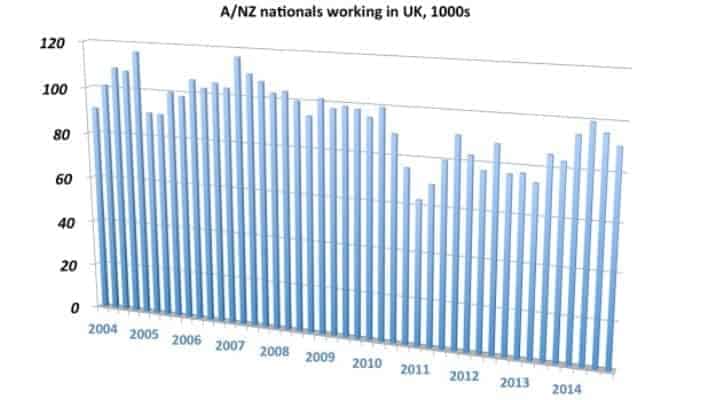The number of Aussies and Kiwis working in the UK is back on the up, according to the latest figures from the British Office of National statistics.
Around 91,000 Australians and New Zealanders were working in the UK in the final quarter of 2014. It’s a jump of almost 10% on the same quarter in 2013 and almost 50% higher than the early 2011 low.

While Antipodean employment is on the increase, it is still well below the mid-noughties, pre-recession peak levels.
In 2007, just prior to the onset of the global financial crisis, there were over 116,000 Aussies and Kiwis working in the UK. As the recession set in from 2008, jobs dried up and the value of the British Pound dropped drastically. Not only was it harder to find a job but the work paid less compared to Down Under.
Around about the same time there was confusion over changes to the UK’s working holiday visa scheme, which became the Tier-5 Youth Mobility visa, while new opportunities opened for young Australians to work in the USA.
All these factors conspired to reduce the number of Antipodeans working in Britain down to just 63,000 by 2011.
It should come as no surprise then that as the UK economy and currency has rebounded, so has the number of foreigners seeking work.
Recently, there has been a campaign, championed by the likes of London Mayor Boris Johnson, to ease some visa restrictions and make it easier for some Commonwealth nationals, including Australians, to work in the UK.
Ralph Buckle, director and co-founder of Commonwealth Exchange, the think tank behind the How to Solve a Problem Like a Visa report, proposing a new bilateral mobility zone between Australia and Britain, welcomed the positive trend but sounded a note of caution.
“It’s encouraging to see more Commonwealth citizens from Australia and New Zealand finding work in the UK but it’s clear that more needs to be done,” he said.
Buckle noted that the 10% increase of Antipodeans working in the UK did not compare favorably to a 15% increase in US nationals and a 23% increase in people from Eastern Europe.
IMAGE: By PHOTOCREO Michal Bednarek via Shutterstock.com







 Explore top-rated compensation lawyers in Brisbane! Offering expert legal help for your claim. Your victory is our priority!
Explore top-rated compensation lawyers in Brisbane! Offering expert legal help for your claim. Your victory is our priority! 

 "
"



